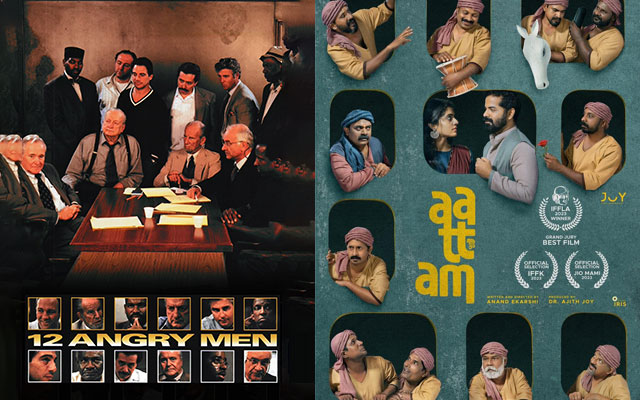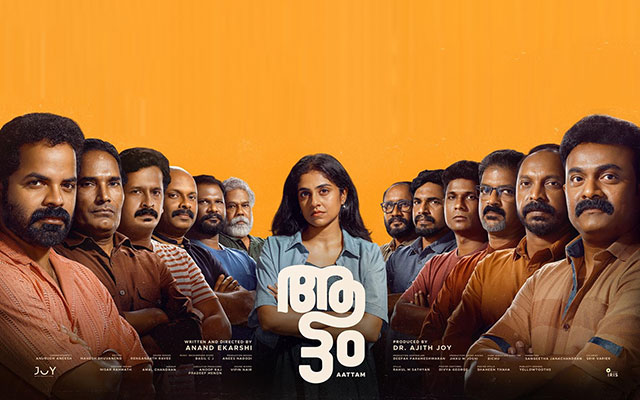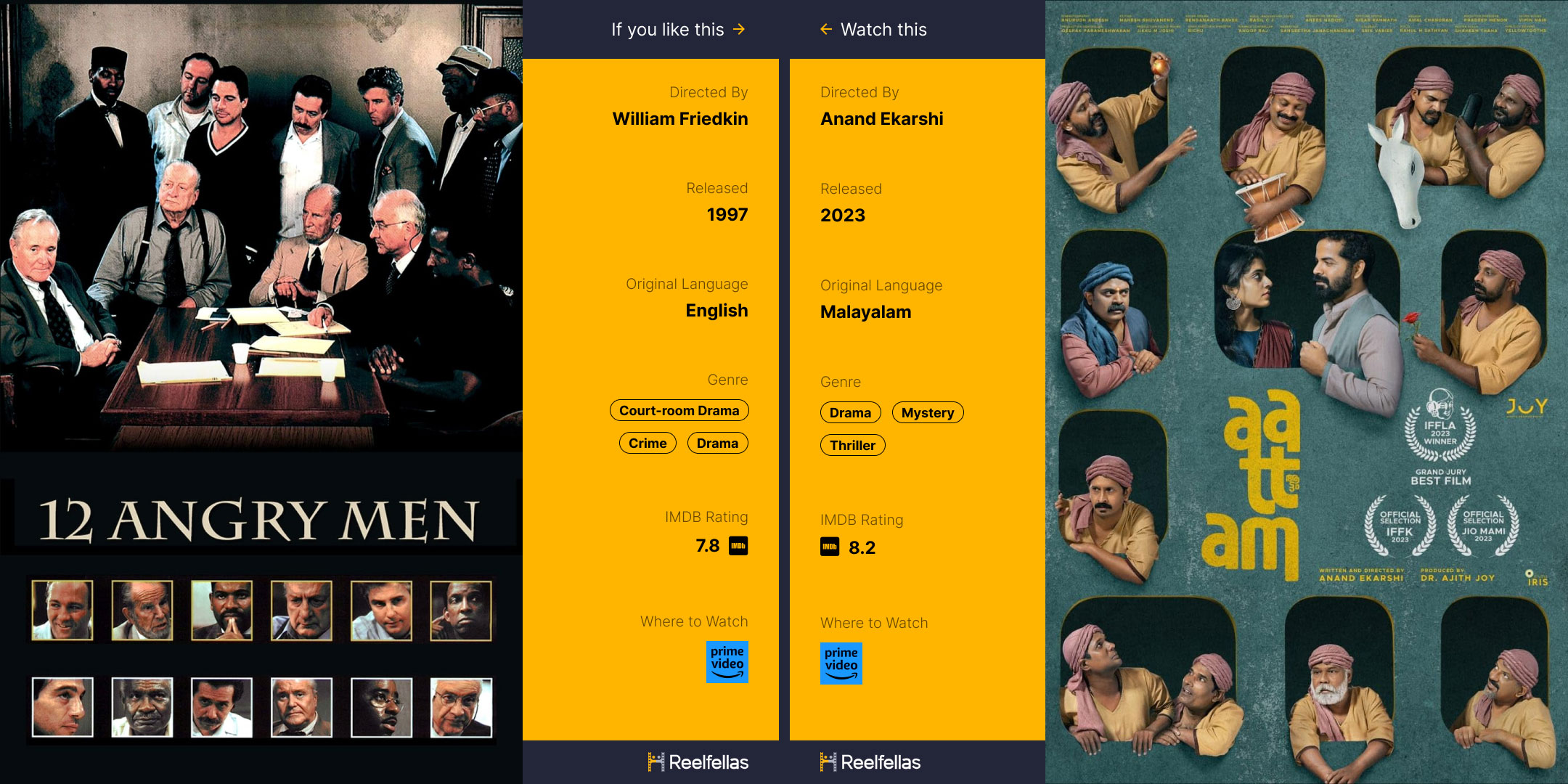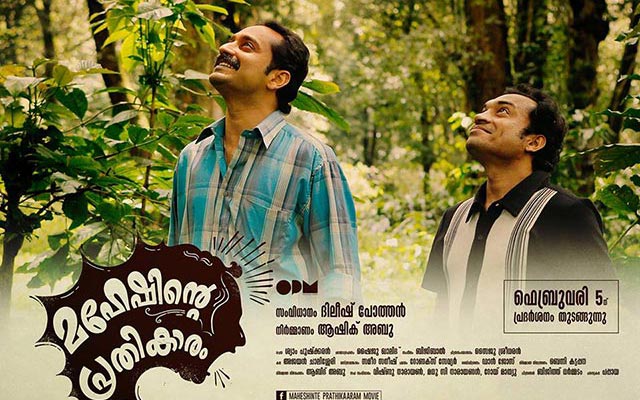Comparative Analysis: "12 Angry Men" (1997) and "Aattam" - A Study in Human Conflict and Justice

"12 Angry Men" (1997), a modern adaptation of the 1957 classic, and "Aattam" (2023), a Malayalam film, both offer compelling insights into human psychology, moral dilemmas, and the concept of justice. While the former revisits a well-known narrative within the confines of the American legal system, the latter brings these themes into a contemporary, culturally distinct setting. This article explores the parallels and contrasts between these two films, focusing on their approach to storytelling, themes, and character development.
Narrative Structure and Setting
"12 Angry Men" (1997), directed by William Friedkin, is a faithful remake of Sidney Lumet's 1957 classic. The film retains the original's single-room setting, where twelve jurors must deliberate the fate of a young man accused of murder. The narrative unfolds in real-time, immersing viewers in the intense discussions and heated arguments as the jurors grapple with their duty to deliver a fair verdict. The film's confined setting amplifies the tension, making the audience feel the claustrophobia and pressure experienced by the jurors.
In contrast, "Aattam" (2023), directed by Anand Ekarshi, employs a more fragmented narrative structure. While it also focuses on intense interpersonal dynamics, the film shifts between different locations and timelines, creating a sense of disorientation that reflects the characters' psychological states. The setting in "Aattam" is more fluid, with the environment playing a crucial role in symbolizing the internal conflicts and emotional turbulence of the characters. This dynamic use of space contrasts with the static, almost suffocating atmosphere of "12 Angry Men (1997)", highlighting different approaches to building tension and exploring human conflict.
Exploration of Themes: Justice and Moral Complexity
Both films grapple with the concept of justice, though they approach it from different cultural and contextual perspectives. In "12 Angry Men (1997)", the theme of justice is deeply rooted in the American judicial system. The film examines the idea of "reasonable doubt" and the moral responsibility of jurors to overcome their biases and ensure a fair trial. The characters represent a cross-section of society, each bringing their own prejudices and life experiences to the table. The film critiques the influence of these biases on the decision-making process, emphasizing the importance of critical thinking and moral integrity in the pursuit of justice.

"Aattam", while not set within a courtroom, also explores the complexities of justice but does so through a more personal and psychological lens. The film's title, which translates to "The Game", suggests a battle of wits and morals, where the characters are entangled in a web of deceit, guilt, and revenge. Unlike the clear-cut legal setting of "12 Angry Men (1997)", "Aattam" portrays justice as a more ambiguous and subjective concept, influenced by personal vendettas, emotional trauma, and the characters' struggle to reconcile with their past actions. The film challenges the audience to consider whether justice is always served by legal means or if it can be achieved through more personal, and sometimes morally questionable, actions.
Character Development and Psychological Tension
Character development is a key strength in both films, though they approach it in different ways. In "12 Angry Men (1997)", each juror is gradually revealed to be more complex than their initial stereotypes suggest. The film delves into their backgrounds, biases, and motivations, allowing the audience to understand the psychological underpinnings of their decisions. The tension between the jurors escalates as they confront their own prejudices and the consequences of their potential verdict, creating a powerful exploration of group dynamics and individual morality.
In "Aattam", the characters are similarly layered, but the film places a greater emphasis on psychological tension and mystery. The narrative gradually peels back the layers of each character, revealing hidden motives and past traumas that drive their actions. The film's non-linear storytelling keeps the audience in suspense, as it becomes increasingly difficult to discern who is trustworthy and who is manipulating the situation for their own gain. This psychological complexity adds a different dimension to the exploration of justice and morality, making "Aattam" a more introspective and unsettling experience compared to the more straightforward deliberations of "12 Angry Men (1997)".
Conclusion

"12 Angry Men (1997)" and "Aattam" are both powerful films that explore the themes of justice, morality, and human psychology, though they do so in distinct ways. "12 Angry Men (1997)" stays true to its predecessor's focus on the American legal system and the moral responsibility of individuals within it, using a single setting to heighten the drama and tension. "Aattam", on the other hand, offers a more fragmented and psychologically intense narrative, exploring justice through the lens of personal conflict and emotional turmoil. Despite their differences, both films invite the audience to reflect on the complexities of human nature and the often murky waters of justice and morality.
Both films, in their own unique ways, invite the audience to reflect on the nature of justice, the complexity of human relationships, and the profound impact of our decisions.




